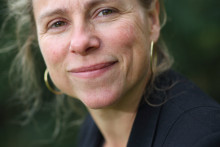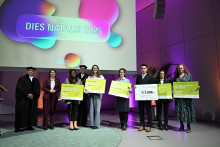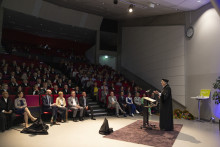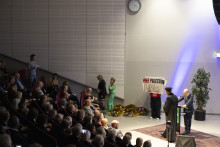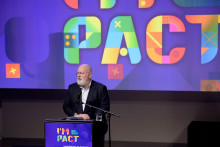What will be the subject of your speech?
‘Rivers, the sea and the Afsluitdijk. I will talk about the Water Engineering & Management (WEM) department and the Civil Engineering education programme. Our research focuses on open water. How does water behave in rivers and along the coast? Streaming water carries grains of sand that continuously change the bed. This is a slow process. We try to establish how this process works, in order to be able to offer smart solutions for dune areas and riverbanks. We need sustainable solutions, because we do not want to cover everything in concrete.’
What is the relevance of this research?
‘We need water, but we are also threatened by it. The Netherlands have a good reputation in the field of water expertise; we earn a lot of money with it. Our country has learned a lot from the threat posed by water in the past. Our water knowledge is among the best in the world. One of the reasons for this is the good collaboration we have in the Netherlands. I recently visited China, where universities are competing with each other. In the Netherlands, we try to collaborate in research. For instance, in the programme RiverCare we have a partnership with five universities and thirty other parties.’
‘Another reason why our research is important is that, in the Netherlands, we intervene rigorously in the landscape. We change everything. In Nijmegen, for example, a side channel was constructed in the river Waal in order to increase the flowing crosssection. Such projects can have a profound effect. We investigate what changes we can expect as a result of such projects. Suppose we deepen the river bed. How long will it take before the bed reaches its old level? If the effect of deepening the river bed is gone after two years, it is not worth doing. We provide the fundamental knowledge to make the realization of projects as sustainable as possible.’
How do you prepare for your Dies Lecture?
‘I am used to giving speeches for people in my field of expertise. The Dies Lecture will be quite different in that respect. I have to consider what will interest my audience. It is similar to preparing for my inaugural lecture. I will present my research using terminology that is understandable to a broad audience. This is not easy, because the science behind it is often complex and difficult. I am happy about the support I get from Marketing and Communication, and of course I do a test run of my speech at home.’
You recently transferred the presidency of the Ambassadors' Network to Marieke Huisman. Are you looking for a new challenge?
‘We are planning a collaboration with the East China Normal University. They have a large lab. In China, the rivers, and therefore the problems, are of an entirely different scale. That is one of the new challenges. Also, I still enjoy research and teaching a lot. I am very proud of the education programme we offer. Recently, a master student said, while we were looking through an old paper of mine: ‘this formula is incorrect’. The formula in the paper was indeed incorrect. The typesetter had made a mistake. Students are open minded. I hear a lot of new things when I work with them. Working with students is very rewarding and it motivates me.’
Suzanne Hulscher will give her speech in the Waaier on Friday 24 November. She is not the first female professor to give the Dies Lecture. Betty Collis preceded her in 1997 with her speech ‘New wine and old bottles: Tele-learning, telematics, and the University of Twente’. The academic ceremony starts at 13:30 (free access). The welcome speech starts at 14:30. To find out more about the Dies Natalis and to register for the event, see the special website.


